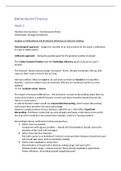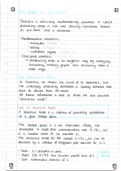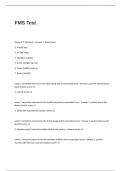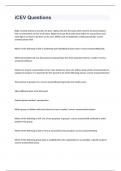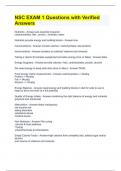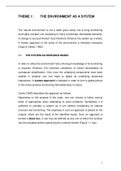Behavioural Finance
Week 5
Monday: Documentary + Intertemporal Choice
Wednesday: Managerial Behavior
Chapter 6: Motivational and Emotional Influences on Decision Making
Deontological approach – Judges the morality of an action based on the action’s adherence
to rules or duties (Kant)
Utilitarian approach – Doing the greatest good for the greatest number of people
The Trolley (Switch) Problem and the Footbridge Dilemma (push a fat man to save 5
people)
The Odyssey: Ulysses during voyage, encounter ‘Sirens’ (female enchanter), tied up with
ropes to ship’s mast to hear it but not stop.
Internal conflicts: What we want to do and what we think we should do (recall affect
heuristic = decision makers have an automatic affective or emotional reaction to most
options).
The ‘multiple-selves’ theory
The impact of temporal differences – The economic concept of discounting states that any
choice that involves a tradeoff between current and future benefits should discount the
future to some extent.
A rational decision maker would use exponential discounting, which means discounting
each future time period by the same percentage.
However, people produce choices (laziness, addiction etc.) that reflect hyperbolic
discounting. This theory states that we view all gains and losses in the future to be worth
less than they would be in the present (for example, crash U.S. housing market).
Reconciling internal conflicts from three perspectives:
1) Advice from economists
Comparison with agency problem – should self (shareholders) should control the
impulses of the want self (manager).
2) Advice from decision theorists
Not both can be in an individual’s interest, communication between should and want
self should take place until reconciliation (Raiffa)
3) Advice from negotiation researchers
Denomination of should self in decision making stage and want self in
implementation stage – impose several criteria during negotiation (agreement,
Pareto efficiency, no pushing outside bargaining zone)
,Perceptions and expectations are biased in a self-serving manner. When presented with
identical information, individuals perceive a situation in dramatically different ways,
depending on their roles in the situation.
A set of basic emotions (happiness, sadness, fear, disgust) can activates a set of feelings and
‘appraised tendencies’ that prepare us to respond to the world in a certain way.
Mood-Congruent Recall – pervasiveness of mood-consistent judgments may well be due to
the same mental processes that generate the confirmation heuristic.
The motivation to minimize the opportunity for regret can lead people to make decisions
that are suboptimal with respect to actual outcomes (bronze award)
Chapter 7:
When approaching decisions serially, there is a tendency to escalate commitment to the
initial decision.
The unilateral escalation paradigm (justifications for nonrational escalation within
individual, because of our own previous commitments): Make a decision as a result of
previous decision. You have invested a great deal of time, effort and resources in your
selected course of action; however, things are not working out as you hoped. We have
learned to ‘Try, ty again’
Recognize that time and expenses we have already invested are ‘sunk costs’ (historical,
irrecoverable and should not be considered in any future course of action. Consider all
future costs and benefits associated with each alternative.
The competitive escalation paradigm (competitive environment increases the tendency to
escalate commitment) – Also ‘too much invested to quit’ but now there is also a desire to
‘win’ (added motivation)
Taxonomy of explanations for the psychological tendency to escalate:
- Perceptual biases
Notice information that supports decision and ignore information that contradicts
initial decision (confirming)
- Judgmental biases
Someone who has not made the initial decision, more likely to choose against initial
decision
- Impression management
Empirical evidence shows that people are more likely to be rewarded for escalating
commitment than for changing course.
- Competitive irrationality
Most dangerous trap is the motive to ‘win’. When two parties become determined
to beat the other side, the stage is set for an escalatory battle in which both lose.
Sometimes people take commitment too far. However, sometimes you should maintain or
even escalate the commitment to keep options open.
, Article 6: Intertemporal choice (Loewenstein & Thaler, 1989)
Intertemporal choices = Decisions in which the timing of costs and benefits are spread out
over time (schooling, marriage, children, save for retirement, invest).
Dynamic Inconsistency – The negative relationship between discount rates and time delay
has important consequences for the dynamic consistency of behavior.
Article 7: From cashews to nudges : the evolution of behavioral economics (Thaler, 2018)
The planner and the doer: principal (planner) -agent (doer) model in this intrapersonal
conflict.
No Free Lunch = it is impossible to predict future stock prices and earn excess returns
except by bearing more risk
The Price Is Right = asset prices are equal to their ‘intrinsic value’
Article 8: Behavioral corporate finance (Shefrin, 2001)
Traditional approach to corporate finance: 1) rational behavior 2) capital asset pricing model
(CAPM) and 3) efficient markets
psychological forces interfere with these components:
- Internal: Impediment behavioral costs: undermine value creation, costs associated
with errors of managers because of cognitive imperfections and emotional
influences
- External (costs)
Article 9: Timid choices and bold forecasts: a cognitive perspective on risk taking (Kahneman
& Lavallo, 1993)
Decision makers are excessively prone to treat problems as unique, neglecting both the
statistics of the past and the multiple opportunities of the future.
Isolation errors:
- Forecasts are often anchored on plans and scenarios of success rather than on past
results
- Evaluations of single risky prospects neglect the possibilities of pooling risks and are
therefore overly timid.
Week 5
Monday: Documentary + Intertemporal Choice
Wednesday: Managerial Behavior
Chapter 6: Motivational and Emotional Influences on Decision Making
Deontological approach – Judges the morality of an action based on the action’s adherence
to rules or duties (Kant)
Utilitarian approach – Doing the greatest good for the greatest number of people
The Trolley (Switch) Problem and the Footbridge Dilemma (push a fat man to save 5
people)
The Odyssey: Ulysses during voyage, encounter ‘Sirens’ (female enchanter), tied up with
ropes to ship’s mast to hear it but not stop.
Internal conflicts: What we want to do and what we think we should do (recall affect
heuristic = decision makers have an automatic affective or emotional reaction to most
options).
The ‘multiple-selves’ theory
The impact of temporal differences – The economic concept of discounting states that any
choice that involves a tradeoff between current and future benefits should discount the
future to some extent.
A rational decision maker would use exponential discounting, which means discounting
each future time period by the same percentage.
However, people produce choices (laziness, addiction etc.) that reflect hyperbolic
discounting. This theory states that we view all gains and losses in the future to be worth
less than they would be in the present (for example, crash U.S. housing market).
Reconciling internal conflicts from three perspectives:
1) Advice from economists
Comparison with agency problem – should self (shareholders) should control the
impulses of the want self (manager).
2) Advice from decision theorists
Not both can be in an individual’s interest, communication between should and want
self should take place until reconciliation (Raiffa)
3) Advice from negotiation researchers
Denomination of should self in decision making stage and want self in
implementation stage – impose several criteria during negotiation (agreement,
Pareto efficiency, no pushing outside bargaining zone)
,Perceptions and expectations are biased in a self-serving manner. When presented with
identical information, individuals perceive a situation in dramatically different ways,
depending on their roles in the situation.
A set of basic emotions (happiness, sadness, fear, disgust) can activates a set of feelings and
‘appraised tendencies’ that prepare us to respond to the world in a certain way.
Mood-Congruent Recall – pervasiveness of mood-consistent judgments may well be due to
the same mental processes that generate the confirmation heuristic.
The motivation to minimize the opportunity for regret can lead people to make decisions
that are suboptimal with respect to actual outcomes (bronze award)
Chapter 7:
When approaching decisions serially, there is a tendency to escalate commitment to the
initial decision.
The unilateral escalation paradigm (justifications for nonrational escalation within
individual, because of our own previous commitments): Make a decision as a result of
previous decision. You have invested a great deal of time, effort and resources in your
selected course of action; however, things are not working out as you hoped. We have
learned to ‘Try, ty again’
Recognize that time and expenses we have already invested are ‘sunk costs’ (historical,
irrecoverable and should not be considered in any future course of action. Consider all
future costs and benefits associated with each alternative.
The competitive escalation paradigm (competitive environment increases the tendency to
escalate commitment) – Also ‘too much invested to quit’ but now there is also a desire to
‘win’ (added motivation)
Taxonomy of explanations for the psychological tendency to escalate:
- Perceptual biases
Notice information that supports decision and ignore information that contradicts
initial decision (confirming)
- Judgmental biases
Someone who has not made the initial decision, more likely to choose against initial
decision
- Impression management
Empirical evidence shows that people are more likely to be rewarded for escalating
commitment than for changing course.
- Competitive irrationality
Most dangerous trap is the motive to ‘win’. When two parties become determined
to beat the other side, the stage is set for an escalatory battle in which both lose.
Sometimes people take commitment too far. However, sometimes you should maintain or
even escalate the commitment to keep options open.
, Article 6: Intertemporal choice (Loewenstein & Thaler, 1989)
Intertemporal choices = Decisions in which the timing of costs and benefits are spread out
over time (schooling, marriage, children, save for retirement, invest).
Dynamic Inconsistency – The negative relationship between discount rates and time delay
has important consequences for the dynamic consistency of behavior.
Article 7: From cashews to nudges : the evolution of behavioral economics (Thaler, 2018)
The planner and the doer: principal (planner) -agent (doer) model in this intrapersonal
conflict.
No Free Lunch = it is impossible to predict future stock prices and earn excess returns
except by bearing more risk
The Price Is Right = asset prices are equal to their ‘intrinsic value’
Article 8: Behavioral corporate finance (Shefrin, 2001)
Traditional approach to corporate finance: 1) rational behavior 2) capital asset pricing model
(CAPM) and 3) efficient markets
psychological forces interfere with these components:
- Internal: Impediment behavioral costs: undermine value creation, costs associated
with errors of managers because of cognitive imperfections and emotional
influences
- External (costs)
Article 9: Timid choices and bold forecasts: a cognitive perspective on risk taking (Kahneman
& Lavallo, 1993)
Decision makers are excessively prone to treat problems as unique, neglecting both the
statistics of the past and the multiple opportunities of the future.
Isolation errors:
- Forecasts are often anchored on plans and scenarios of success rather than on past
results
- Evaluations of single risky prospects neglect the possibilities of pooling risks and are
therefore overly timid.


